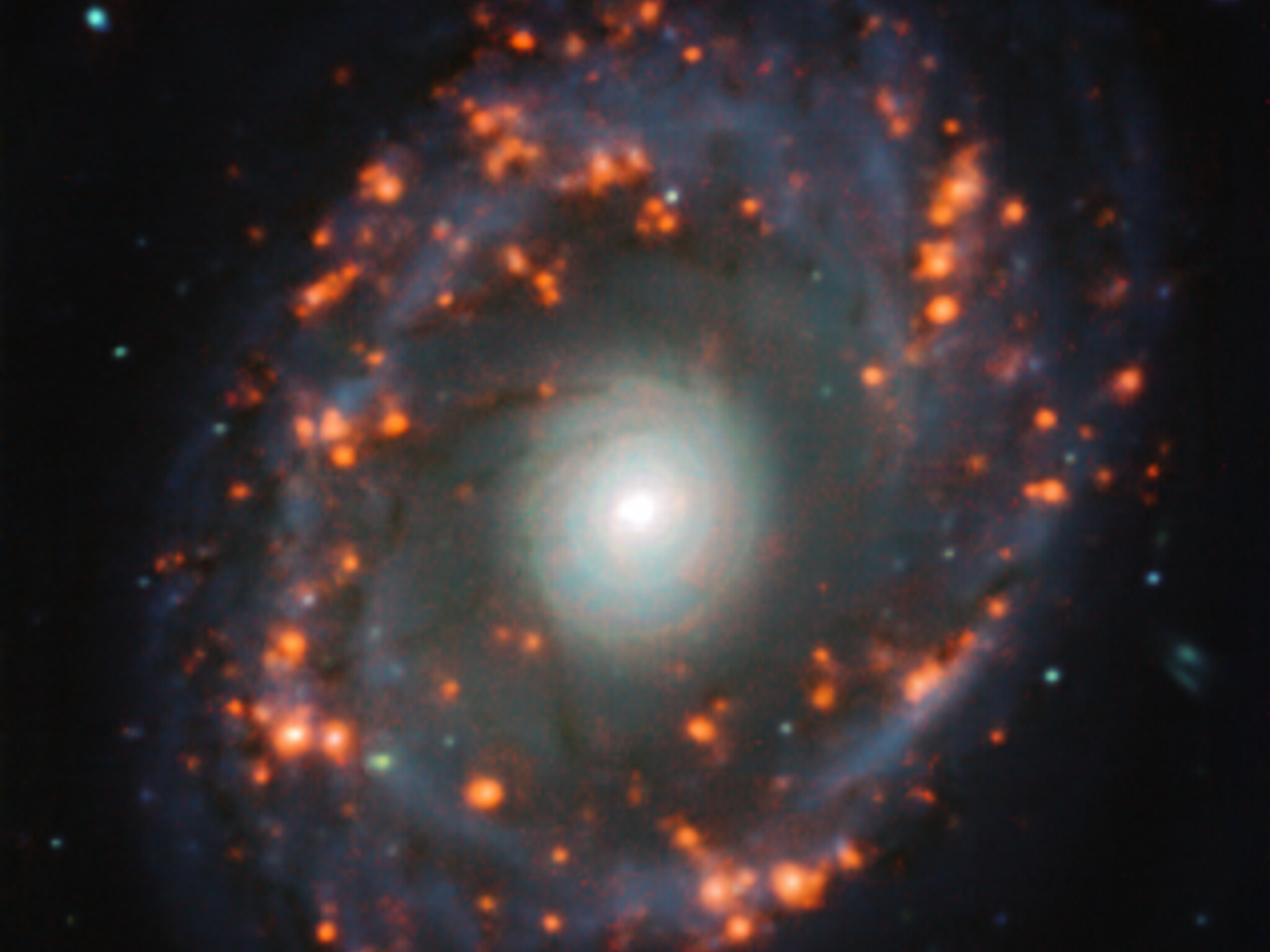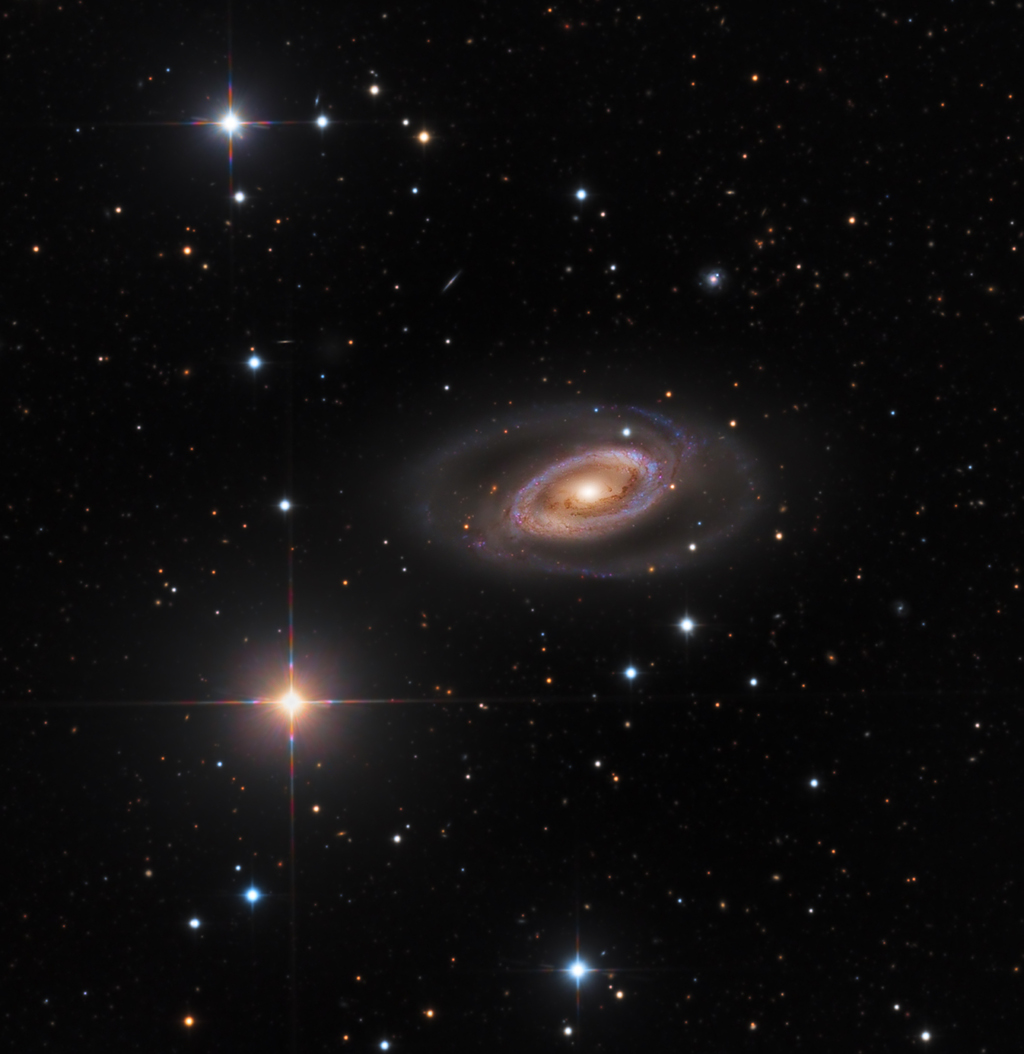Blog
Mardi Gras weekend 2021
more...Discovered in the year 1836 by John Herschel, NGC 6902 is a beautiful spiral galaxy located more than 130 million light-years away in the constellation of Sagittarius, the Archer. This image was taken with MUSE, the Multi Unit Spectroscopic Explorer instrument attached to one of the four 8.2-metre telescopes that make up the VLT, and shows the galaxy from a unique perspective. A zoom in towards the galaxy’s centre, the image shows a nuclear ring where the orange glow of intense star formation is visible. Inside this ring lies a faint and small bar of stars. Researchers found that stars within it are distributed differently depending on their age, with younger stars aligned along the bar and older stars more dispersed. These locations of the young and old stars within the central bar of NGC 6902 confirm predictions made years earlier from simulations and models. This is the first time these predictions of galactic structure were confirmed with observations thanks to the incredible spatial resolution of the MUSE instrument.

Peter Brian Gabriel (born 13 February 1950) is an English musician, singer, songwriter, record producer and activist. He rose to fame as the original lead singer of the progressive rock band Genesis. After leaving Genesis in 1975, he launched a successful solo career with “Solsbury Hill” as his first single. His 1986 album, So, is his best-selling release and is certified triple platinum in the UK and five times platinum in the U.S. The album’s most successful single, “Sledgehammer“, won a record nine MTV Awards at the 1987 MTV Video Music Awards and, according to a report in 2011, it was MTV‘s most played music video of all time.
Gabriel has been a champion of world music for much of his career. He co-founded the WOMAD festival in 1982. He has continued to focus on producing and promoting world music through his Real World Records label. He has also pioneered digital distribution methods for music, co-founding OD2, one of the first online music download services. Gabriel has also been involved in numerous humanitarian efforts. In 1980, he released the anti-apartheid single “Biko“. He has participated in several human rights benefit concerts, including Amnesty International‘s Human Rights Now! tour in 1988, and co-founded the Witness human rights organisation in 1992.[9] Gabriel developed The Elders with Richard Branson, which was launched by Nelson Mandela in 2007.
Gabriel has won three Brit Awards—winning Best British Male in 1987, six Grammy Awards, thirteen MTV Video Music Awards, the first Pioneer Award at the BT Digital Music Awards, the Q magazine Lifetime Achievement, the Ivor Novello Award for Lifetime Achievement, and the Polar Music Prize. He was made a BMI Icon at the 57th annual BMI London Awards for his “influence on generations of music makers”. In recognition of his many years of human rights activism, he received the Man of Peace award from the Nobel Peace Prize laureates in 2006, and Timemagazine named him one of the 100 most influential people in the world in 2008.AllMusic has described Gabriel as “one of rock’s most ambitious, innovative musicians, as well as one of its most political”. He was inducted into the Rock and Roll Hall of Fame as a member of Genesis in 2010,followed by his induction as a solo artist in 2014. In March 2015, he was awarded an honorary doctorate from the University of South Australia in recognition of his achievements in music.
more...King Floyd (February 13, 1945 – March 6, 2006) was a New Orleans soul singer and songwriter, best known for his Top 10 hit from 1970, “Groove Me“. King Floyd III was born in New Orleans in 1945. His musical career started as a singer at the Sho-Bar on Bourbon Street. Following a stint in the army, Floyd went to California, where he joined up with record producer Harold Battiste. His debut album, A Man In Love, featuring songs co-written with Dr. John, failed to make an impact on the charts. Floyd returned to New Orleans in 1969 and worked for the Post Office.
In 1970, Wardell Quezergue, an arranger of R&B scores, persuaded Floyd to record “Groove Me” with Malaco Records in Jackson, Mississippi. Jean Knight recorded her hit, “Mr. Big Stuff,” in the same sessions.
At first, “Groove Me” was a B-side to another Floyd song, “What Our Love Needs.” New Orleans radio DJs started playing “Groove Me” and the song became a local hit. Atlantic Records picked up national distribution of “Groove Me,” which topped the United States R&B chart and reached #6 on the Billboard Hot 100 and went to #41 in Britain. This disc sold over one million copies, and received a gold disc awarded by the R.I.A.A. in December 1970. Floyd quit his job at the post office to perform a U.S. tour. His follow-up single, “Baby Let Me Kiss You” climbed up to number 29 on the Billboard Top 40 charts in 1971.
more...Anthony “Rebop” Kwaku Baah (13 February 1944 – 12 January 1983) was a Ghanaian percussionist who worked with the 1970s rock groups Traffic and Can. Baah was born on 13 February 1944, in Konongo, Ghana.
In 1969, Baah performed on Randy Weston‘s album African Rhythms. In the same year he worked with Nick Drake on the song “Three Hours”, posthumously released in 2004 on the compilation album Made to Love Magic. He then joined the English band Traffic in 1971, having met them in Sweden during a tour. He appeared on the albums Welcome to the Canteen, The Low Spark of High Heeled Boys, Shoot Out at the Fantasy Factory, On the Road, and When the Eagle Flies.
In 1973 he performed in the all-star Eric Clapton’s Rainbow Concert. After Traffic disbanded in 1974, he played on Steve Winwood’s self-titled debut solo album, which was released in 1977. Also in 1977, he joined the German band Can along with former Traffic bassist Rosko Gee, playing with them until their breakup in 1979, appearing on the albums Saw Delight, Out of Reach and Can.
In 1982 Baah recorded an album with Zahara. Baah died of a cerebral hemorrhage during a performance in Stockholm, Sweden in January 1983, where he was on tour with Jimmy Cliff. His final album, Melodies in a Jungle Man’s Head, was released in its unfinished state.
more...Wardell Gray (February 13, 1921 – May 25, 1955) was an American jazz tenor saxophonist who straddled the swing and bebop periods.
Wardell Gray was born in Oklahoma City, the youngest of four children. His early childhood years were spent in Oklahoma, before moving with his family to Detroit in 1929. In early 1935, Gray began attending Northeastern High School, and then transferred to Cass Technical High School, which is noted for having Donald Byrd, Lucky Thompson and Al McKibbon as alumni. He left in 1936, before graduating. Advised by his brother-in-law Junior Warren, as a teenager he started on the clarinet, but after hearing Lester Young on record with Count Basie, he was inspired to switch to the tenor saxophone.
Gray was still working regularly despite his drug problems, and when Benny Carter was engaged in May 1955 to provide the band at the opening of the Moulin Rouge Hotel, he called on Gray. Gray attended rehearsals but was absent when the club opened on May 25. The next day he was found on a stretch of desert on the outskirts of Las Vegas[5] dead with a broken neck.
Although there was a poor examination of circumstances, by most accounts, Gray’s demise was ruled an accidental death.[citation needed] Foul play was suspected by some, especially given Gray’s possible association with mob boss Meyer Lansky.
more...
NGC 1350 lies about 85 million light-years distant in the southern constellation Fornax. Inhabited by young blue star clusters, the tightly wound spiral arms of NGC 1350 seem to join in a circle around the galaxy’s large, bright nucleus, giving it the appearance of a cosmic eye. In fact, NGC 1350 is about 130,000 light-years across. That makes it as large or slightly larger than the Milky Way. For earth-based astronomers, NGC 1350 is seen on the outskirts of the Fornax cluster of galaxies, but its estimated distance suggests that it is not itself a cluster member. Of course, the bright spiky stars in the foreground of this telescopic field of view are members of our own spiral Milky Way galaxy.

more...
Narasimhan Ravikiran (born 12 February 1967) is an Indian slide instrumentalist, vocalist, composer, and orator, who created the concept of melharmony. He is the son of gottuvadhyam player Chitravina Narasimhan and the grandson of Narayan Iyengar, who was also a Carnaticmusician.
Ravikiran was born in Mysore, Karnataka. He made his first appearance at the age of two, in April and again in August 1969, in Bangalore, and was interviewed by Semmangudi Srinivasa Iyer, Pandit Ravi Shankar, M S Subbulakshmi and Flute T R Mahalingam. He also performed at the XLIII Madras Music Conference held at The Madras Music Academy in December 1969, and was awarded a scholarship from the academy. He was able to identify about 325 ragas (melodic scales) and 175 talas (rhythmic cycles) of Carnatic music. Ravi Shankar is said to have declared “If you don’t believe in God, look at Ravikiran”. Soon after, he was presented at leading institutions such as Shanmukhananda Fine Arts, Bombay and Tyagaraja Sabha, Coimbatore.
Following training under his father, Chitravina Narasimhan, Ravikiran debuted as a vocalist in 1972, when he was five years old, in Coimbatore.[citation needed] He performed at concerts in Madras, Mysore and Bangalore until he was 10. His recitals – often over two and a half hours – drew large audiences and won critical acclaim in the Indian media.
more...Omar Hakim (born February 12, 1959) is an American jazz, jazz fusion and pop music drummer, producer, arranger and composer. He has worked with Weather Report, David Bowie, Foo Fighters, Sting, Madonna, Dire Straits, Journey, Kate Bush, George Benson, Miles Davis, Daft Punk, Mariah Carey, The Pussycat Dolls and Celine Dion.
Hakim was born in New York City on February 12, 1959. His father, Hasaan Hakim, was a trombonist. Omar started playing the drums at the age of five, and first performed in his father’s band four or five years later.
https://www.youtube.com/watch?v=Iwk3E9jD5lk
more...William Otis Laswell (born February 12, 1955) is an American bass guitarist, record producer, and record label owner. He has been involved in thousands of recordings with many collaborators from all over the world. His music draws from funk, world music, jazz, dub and ambient styles.
According to music critic Chris Brazier, “Laswell’s pet concept is ‘collision music’ which involves bringing together musicians from wildly divergent but complementary spheres and seeing what comes out.” The credo of one record label run by Laswell which typifies much of his work is “Nothing Is True, Everything Is Permitted”. Although his bands may be credited under the same name and often feature the same roster of musicians, the styles and themes explored on different albums can vary dramatically. Material began as a noisy dance music band, but later albums concentrated on hip hop, jazz, or spoken word readings by William S. Burroughs. Most versions of the band Praxis have included guitarist Buckethead, but they have explored different permutations on albums.
Laswell got his earliest professional experience as a bass guitarist in R&B and funk bands in Detroit and Ann Arbor, Michigan. He saw shows that combined genres, such as Iggy and the Stooges, MC5, and Funkadelic. He was also influenced by jazz musicians John Coltrane, Albert Ayler, and Miles Davis.
https://www.youtube.com/watch?v=KC-5X50Zj6M
more...Raymond Daniel Manzarek Jr. (born Manczarek; February 12, 1939 – May 20, 2013) was an American musician, singer, producer, film director, and author. He was best known as a member of the Doors from 1965 to 1973, which he co-founded with singer and lyricist Jim Morrison.
Manzarek was inducted into the Rock and Roll Hall of Fame in 1993 as a member of the Doors. He was a co-founding member of Nite City from 1977 to 1978, and of Manzarek–Krieger from 2001 until his death in 2013. USA Today defined him as “one of the best keyboardists ever”.
Raymond Daniel Manczarek Jr. was born and raised on the South Side of Chicago, Illinois. He was born to Helena (1918–2012) and Raymond Manczarek Sr. (1914–1987), and was of Polish descent.
more...Although Soleá is not the oldest, it is the style that has best preserved the values and qualities of ‘jondo art’: for its compass (combination of 6/8 and 3/4); its tone and its melody. It is one of the most danced and emblematic styles of flamenco and, given its characteristics, it adapts very well to the interpretation of flamenco dancers, since it invites to perform hip swings, waist swings and arms movements more typical of women . Singing to Soleá accompanies the guitar. The most sung lyrics of the soleares refer to places in America such as Havana or Puebla. In a series of soleares, the lyrics do not have much to do with each other, because they deal with different themes and the singer can take a tour of the sentimental variety of this stick during his performance.
We could say that a soleá is structured in the following way: introduction of guitar, ayeo of exit (the interpretation of the ‘ay ay ay’ of the singer); sing of preparation, brave singing and auction, with falsetas interspersed during the interpretation of the different lyrics (the falseta is the part of the music that the guitarist improvises).
more...More Posts
- World Music with Henri Dikongue
- Daily Roots with Junior Byles
- Mt Zion Shabbat Service 3-23-18
- The Cosmos with Sharpless 249
- Chaka Khan Day
- Dave Pike Day
- Louisiana Red Day
- Sticks McGhee Day
- World Music with Kiki morente y Juan Habichuela
- Daily Roots with the Bluebells
- The Cosmos with NGC 253
- George Benson Day
- Jon Hassell Day
- Fred Anderson Day
- World Music with Sally Nyolo
- Daily Roots with Freddie McGregor
- RHYTHM ROOTS WORKSHOP 3-21-18
- The Cosmos with NGC 3972
- Yoshio Suzuki Day
- Solomon Burke Day

